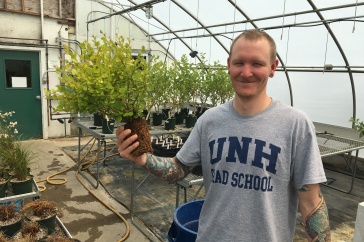
Brianna LaCarubba ’18G, a graduate student in integrative organismal biology in the department of biological sciences, has been recognized with a Trainee Professional Development Award from the Society for Neuroscience (SfN).?She was selected from hundreds of graduate students and postdoctoral researchers from all over the world.
The award recognizes undergraduate and graduate students and postdoctoral fellows demonstrating scientific merit and excellence in research.
As a part of the honor, LaCarubba will present her research at an SfN poster session, during which she’ll have an opportunity to meet peers and network with senior scientists. She will also participate in learning opportunities at the SfN annual meeting.
LaCarubba’s interest in neuroscience began when she was an undergraduate at Boston College, where she studied the effect of omega-3 fatty acids on cognition and memory in lobsters. At UNH, LaCarubba is studying a calcium channel called CaV1.3 under the direction of Arturo Andrade, assistant professor of neurobiology. CAV1.3 is involved in a variety of biophysical functions, and impairments are linked to a variety of disorders including autism, Parkinson’s, schizophrenia?and bradycardia.
“CaV1.3 has many isoforms — which are different forms of essentially the same protein — and my goal is to understand where and when these isoforms are present?and what their functions are,” says LaCarubba. “Right now, modern medicine largely ignores the diversity of splice isoforms. This is despite the fact that natural variation in splice isoforms has been shown to influence both disease susceptibility and drug response. In the long term, I believe fully understanding the location and function of the splice isoforms could inform patient drug decisions, as well as the investigation of new drug targets, especially as the field moves toward more and more personalized medicine.”
Following graduation, LaCarruba is considering a future in pharmaceutical research or possibly a doctorate.
“I love research and being at a lab bench,” she says. “When you find a solution it’s the best feeling.”
Learn more about UNH's biological sciences graduate program.
-
Written By:
Sarah Schaier | College of Life Sciences and Agriculture




















































